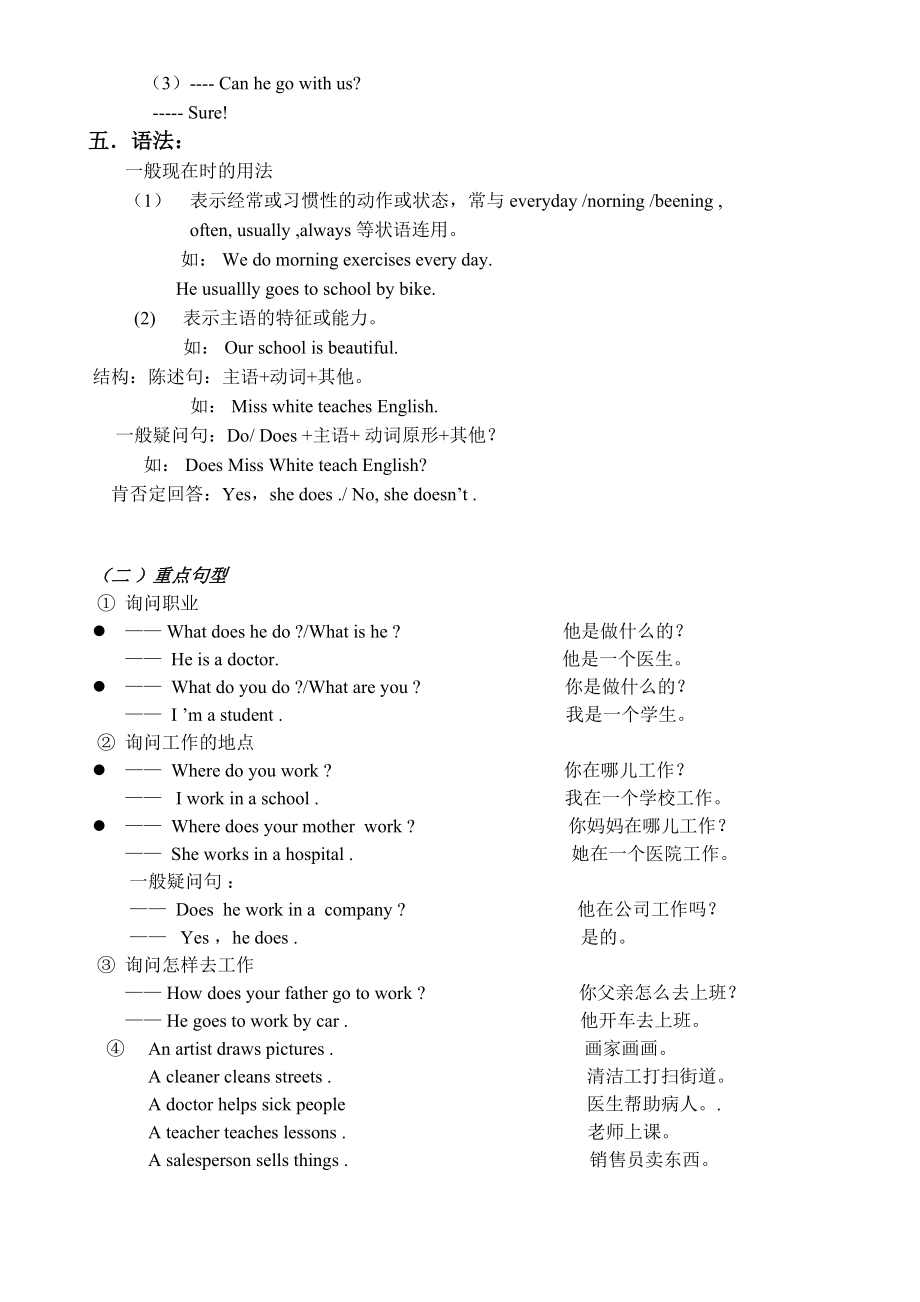



下載本文檔
版權(quán)說(shuō)明:本文檔由用戶提供并上傳,收益歸屬內(nèi)容提供方,若內(nèi)容存在侵權(quán),請(qǐng)進(jìn)行舉報(bào)或認(rèn)領(lǐng)
文檔簡(jiǎn)介
1、n How do you go to school ? 你怎樣去上學(xué)? I go to school on foot . 我走路去上學(xué)。n How do you go to Canada ? 你怎么去加拿大。 I go by plane . 我坐飛機(jī)去。n How does your father go to work ? 你父親怎樣去上班? He goes to work by subway . 他坐地鐵去上班。 詢問(wèn)地點(diǎn),用疑問(wèn)代詞where n Where is your home ? 你家在哪里? Its near the post office . 在郵局旁邊。n Where are
2、 the teachers ? 老師們?cè)谀膬海?They are in the teachers office . 在老師的辦公室。 問(wèn)路n How can I get to Zhongshan Park ? 我怎么去中山公園?你可以坐一路車(chē)去。 You can go by the No.1 bus. You can take the No .1 bus . 交通規(guī)則(traffic rules )n Stop at a red light . 紅燈停n Wait at a yellow light . 黃燈停n Go at a green light . 綠燈行n In China and
3、the US , drivers drive on the right side of the road . 在中國(guó)和美國(guó),司機(jī)靠右行駛。n In England and Australia, however, drivers drive on the left side of the road. 但是在英國(guó)和澳大利亞,司機(jī)靠左邊行駛。句 型一、問(wèn)路1Where is the cinema, please? 請(qǐng)問(wèn)電影院在哪兒? next to the hospital. 在醫(yī)院的旁邊。 in front of the school. 在學(xué)校的前面. behind the park 在公園的后面
4、Its near the zoo. 在動(dòng)物園的附近.on the right/left of the bookstore. 在書(shū)店的左/右邊.east of the bank. 在銀行的東邊.far from here. 離這兒很遠(yuǎn).2. Excuse me, is there a cinema near here 請(qǐng)問(wèn)這附近有電影院?jiǎn)幔縔es, there is. 有.3. How can I get to the hospital? 我該怎樣到達(dá)醫(yī)院呢?You can go 二、指引路1 You can go by the No.312 bus. 你可乘坐312路公交車(chē)去那兒.2. Get
5、 on / off at the 在地方上車(chē)/ 下車(chē).3. Walk straight for three minutes. 向前直走在分鐘.4. Turn right/ left at the 在 地方向右/ 左轉(zhuǎn).5. Walk east/ west/ south/ north for minutes. 朝東/ 西/南/北/ 走分鐘.三 Is it far from here? 離這兒遠(yuǎn)嗎? Yes, it is. / No, it isnt. 二、 重點(diǎn)句式和句型: 本單元中出現(xiàn)的一個(gè)重點(diǎn)語(yǔ)法項(xiàng)目是一般將來(lái)時(shí):表示將要發(fā)生的動(dòng)作或狀態(tài) ,常和表示將來(lái)的時(shí)間連用。 構(gòu)成: 陳述肯定句: b
6、e going to + V原+ 其他 否定句: be + not going to + V原+其他 一般疑問(wèn)句: Be+ 主語(yǔ)+ going to + V原 +其他 特殊疑問(wèn)句: 特殊疑問(wèn)詞+ 一般疑問(wèn)句 ? E.g. I am going to the bookstore by bus this afternoon. Im not going to the bookstore by bus this afternoon. Yes, I am. Are you going to the bookstore by bus this afternoon? No, Im not. What are
7、 you going to do this afternoon? Where are you going this afternoon? How are you going to the bookstore this afternoon? When are you going to the bookstore by bus? 三、 重點(diǎn)句型:1. Im going to have a busy weekend! 我將要度過(guò)一個(gè)繁忙的周末。2. That will be fun! 那將會(huì)很有意思。 3. What else? 還要什么?4. -What are you going to do i
8、n the future? 你將來(lái)想干什么? -Im going to be a science teacher one day. 我想將來(lái)有一天當(dāng)科學(xué)老師。 - What about you ? 你呢? -I want to be a computer expert in the future. 我想當(dāng)個(gè)電腦專(zhuān)家。 四句型:1 詢問(wèn)某人的愛(ài)好:-Whats your hobby? 你的愛(ài)好是什么?-I like collecting stamps. 我喜歡集郵2. 表示征求別人意見(jiàn): (1)-what about you ? 你呢? -Me too. 我也是。 (2)- Lets go to
9、gether. 讓我們一起去吧。(3)- Can he go with us? - Sure!五語(yǔ)法:一般現(xiàn)在時(shí)的用法(1) 表示經(jīng)常或習(xí)慣性的動(dòng)作或狀態(tài),常與everyday /norning /beening ,often, usually ,always 等狀語(yǔ)連用。 如: We do morning exercises every day. He usuallly goes to school by bike. (2) 表示主語(yǔ)的特征或能力。如: Our school is beautiful. 結(jié)構(gòu):陳述句:主語(yǔ)+動(dòng)詞+其他。如: Miss white teaches English
10、. 一般疑問(wèn)句:Do/ Does +主語(yǔ)+ 動(dòng)詞原形+其他? 如: Does Miss White teach English? 肯否定回答:Yes,she does ./ No, she doesnt . (二 )重點(diǎn)句型 詢問(wèn)職業(yè)l What does he do ?/What is he ? 他是做什么的? He is a doctor. 他是一個(gè)醫(yī)生。l What do you do ?/What are you ? 你是做什么的? I m a student . 我是一個(gè)學(xué)生。 詢問(wèn)工作的地點(diǎn)l Where do you work ? 你在哪兒工作? I work in a scho
11、ol . 我在一個(gè)學(xué)校工作。l Where does your mother work ? 你媽媽在哪兒工作? She works in a hospital . 她在一個(gè)醫(yī)院工作。 一般疑問(wèn)句 : Does he work in a company ? 他在公司工作嗎? Yes ,he does . 是的。 詢問(wèn)怎樣去工作 How does your father go to work ? 你父親怎么去上班? He goes to work by car . 他開(kāi)車(chē)去上班。 An artist draws pictures . 畫(huà)家畫(huà)畫(huà)。 A cleaner cleans streets . 清潔工打掃街道。 A doctor helps sick people 醫(yī)生幫助病人。. A teacher teaches lessons . 老師上課。 A salesperson sells things . 銷(xiāo)售員賣(mài)東西。 重要句型:1. Where does the rain come from? 雨來(lái)自于哪兒?It comes from the cloud. 雨來(lái)自于云朵.(注意同be from 區(qū)分) Where are you from? 你來(lái)自于哪?Im from China. 我來(lái)自于中國(guó).2. How do you do that? 你怎樣做呢?
溫馨提示
- 1. 本站所有資源如無(wú)特殊說(shuō)明,都需要本地電腦安裝OFFICE2007和PDF閱讀器。圖紙軟件為CAD,CAXA,PROE,UG,SolidWorks等.壓縮文件請(qǐng)下載最新的WinRAR軟件解壓。
- 2. 本站的文檔不包含任何第三方提供的附件圖紙等,如果需要附件,請(qǐng)聯(lián)系上傳者。文件的所有權(quán)益歸上傳用戶所有。
- 3. 本站RAR壓縮包中若帶圖紙,網(wǎng)頁(yè)內(nèi)容里面會(huì)有圖紙預(yù)覽,若沒(méi)有圖紙預(yù)覽就沒(méi)有圖紙。
- 4. 未經(jīng)權(quán)益所有人同意不得將文件中的內(nèi)容挪作商業(yè)或盈利用途。
- 5. 人人文庫(kù)網(wǎng)僅提供信息存儲(chǔ)空間,僅對(duì)用戶上傳內(nèi)容的表現(xiàn)方式做保護(hù)處理,對(duì)用戶上傳分享的文檔內(nèi)容本身不做任何修改或編輯,并不能對(duì)任何下載內(nèi)容負(fù)責(zé)。
- 6. 下載文件中如有侵權(quán)或不適當(dāng)內(nèi)容,請(qǐng)與我們聯(lián)系,我們立即糾正。
- 7. 本站不保證下載資源的準(zhǔn)確性、安全性和完整性, 同時(shí)也不承擔(dān)用戶因使用這些下載資源對(duì)自己和他人造成任何形式的傷害或損失。
最新文檔
- 2025年中國(guó)可移動(dòng)的模塊化結(jié)構(gòu)行業(yè)市場(chǎng)全景分析及前景機(jī)遇研判報(bào)告
- 2025年中國(guó)可編程照明行業(yè)市場(chǎng)全景分析及前景機(jī)遇研判報(bào)告
- 2025年中國(guó)抗衰老眼霜行業(yè)市場(chǎng)全景分析及前景機(jī)遇研判報(bào)告
- 氨綸抽條密絲絨項(xiàng)目投資可行性研究分析報(bào)告(2024-2030版)
- 口腔健康與肌膚護(hù)理
- syb培訓(xùn)動(dòng)畫(huà)課件
- 2025年 什邡市市級(jí)機(jī)關(guān)遴選考試筆試試題附答案
- 2025-2030年中國(guó)產(chǎn)銷(xiāo)化工油漆類(lèi)行業(yè)深度研究分析報(bào)告
- 護(hù)具系列項(xiàng)目可行性研究報(bào)告
- 2025年 北京市海淀區(qū)學(xué)院路小學(xué)招聘考試筆試試題附答案
- 水表檢定記錄全冊(cè)
- 安徽省合肥市廬陽(yáng)區(qū)2022-2023學(xué)年五年級(jí)下學(xué)期期末科學(xué)試卷
- DG-TJ08-2411-2023 地下結(jié)構(gòu)隔排水主動(dòng)抗浮技術(shù)標(biāo)準(zhǔn)
- 三期(孕期、產(chǎn)期、哺乳期)員工風(fēng)險(xiǎn)評(píng)估
- 國(guó)家開(kāi)放大學(xué)《土地利用規(guī)劃》本章自測(cè)參考答案
- 多重耐藥菌相關(guān)知課件
- 競(jìng)選車(chē)間班長(zhǎng)的演講稿
- 校園欺凌事件調(diào)解協(xié)議書(shū)
- 麗思卡爾頓酒店介紹
- 藥物過(guò)敏性休克急救護(hù)理課件
- 國(guó)企物流公司筆試題庫(kù)答案

評(píng)論
0/150
提交評(píng)論